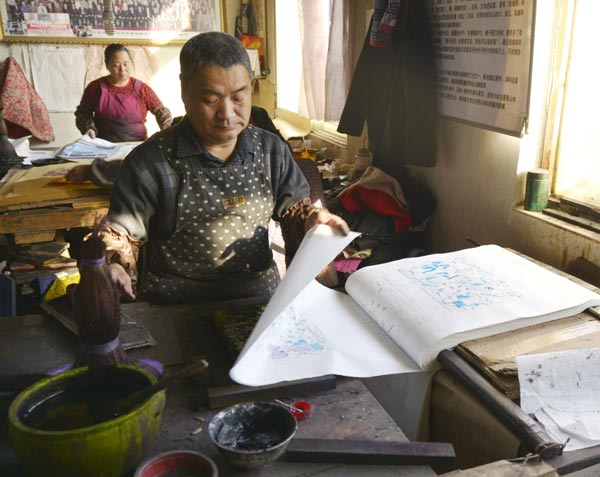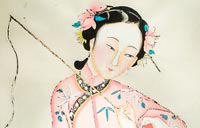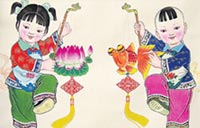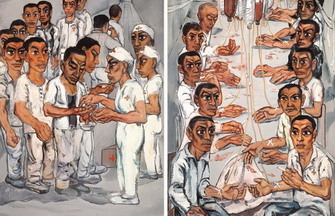A family art
By Wang Qian and Ju Chuanjiang ( China Daily ) Updated: 2014-02-26 08:47:49
 |
|
Villagers work at their family New Year painting workshop in Yangjiabu village, Weifang, Shandong province. |
 |
| New Year paintings decorate Shanghai |
 |
| Portraits of fortune |
"Yangjiabu painting stands out with its rich use of bright color, rough lines, exaggerated images, and full composition. It is pure and down-to-earth, and it is especially favored among the Chinese public," says Wang.
There is an old saying that during the Qing Dynasty (1644-1911), each family in Yangjiabu had a painting workshop, and everybody was good at the handicraft, he says.
The custom is particularly popular in the countryside, where colorful paintings remain the dominant decorations on doors, windows, walls and even on wardrobes and stoves throughout the year.
"However, with the invasion of modern production methods, traditional printing techniques have been challenged and few young people have enough patience to learn the craft," says Zhang Dianying, a local well-known folk artist and vice-president of China Woodprint New Year Painting Association.
"Making a Yangjiabu New Year painting generally requires at least 10 steps, ranging from sketching outlines, engraving the woodblock, printing and painting to mounting. All of them have to be completed by hand," the 78-year-old explains.
"The most difficult step is the carving. One wooden board needs to be engraved for one kind of color. To master such a skill requires years of experience," says Zhang, whose palms show signs of wear, dyed yellow with thick calluses.
To show the versatility of the art form, Zhang spent four years engraving a total of 531 woodblocks and creating a 32-meter-long painting. Named The Happiness of Chinese Farmers, it vividly depicts more than 1,000 characters and 100 scenes. It is said to be the nation's largest woodblock-printed painting and is part of the collection of the National Museum of China.
"My work is a piece of art, which cannot be achieved by machines," he says with great pride.
For more China Face stories, click here
|
|
|
|
|
|
|
|






















 Raymond Zhou:
Raymond Zhou: Pauline D Loh:
Pauline D Loh: Hot Pot
Hot Pot Eco China
Eco China China Dream
China Dream China Face
China Face





